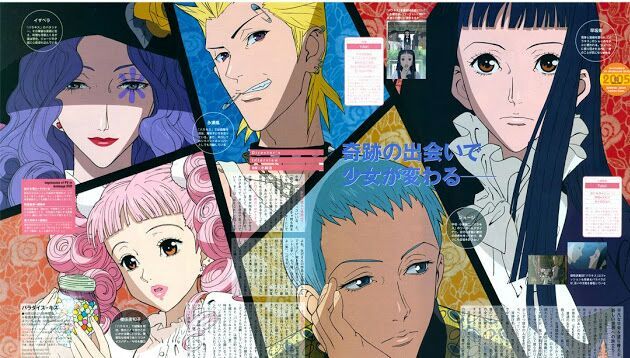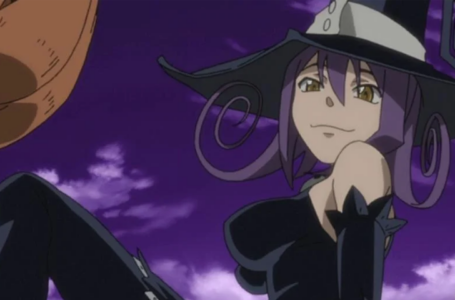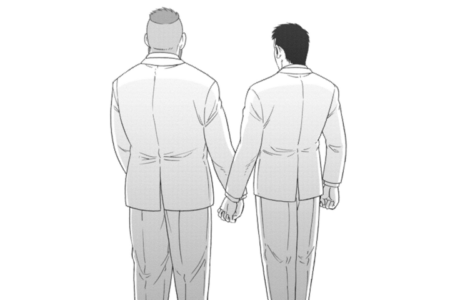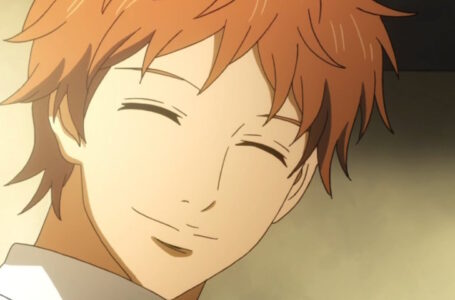How Yazawa Ai achieves bittersweet bliss with Paradise Kiss
Yazawa Ai is famed for her Nana series, a favourable mangaka who consistently creates stories set in reality with a very appealing maturity and realism to them. And what better time to bring this incredible Josei manga up than now with this years’ release of the 20th Anniversary Edition compiling the entire story in one book?
Please note of triggering subjects of abuse, rape and transphobia being mentioned in the article and manga.
What is Paradise Kiss?
Yazawa Ai should not be an unfamiliar name to those into anime or manga. Most widely known as the mangaka of Nana, a just as emotional rollercoaster of a journey following a young woman but with no finale to ever see the light of day. Despite this it’s still one of the best regarded Josei manga titles out there, unfortunately overshadowing Paradise Kiss which has a far tighter and more coherent story considering its shorter run time. And we even received a conclusion that I argue to this day is one of the best endings to a romantic manga ever.
Paradise Kiss follows student Yukari, whose daily life of cramming after school studying is completely changed when approached by four eccentric high schoolers of the elite design college. Through bonding with these unusual students, she finds her calling as an up and coming model as she initially, begrudgingly joins their design group called Paradise Kiss. Funnily enough, Yazawa had wanted to be a fashion designer if she was not a mangaka, and you can definitely tell by the many glorious outfit designs. It’s pure eye candy, and just one reason why Paradise Kiss is worth a read. But let’s get into our fun analysis section now.
Be prepared for spoilers.

What makes Paradise Kiss a different take on romance and social norms
When do I not go on about themes and underlining meanings? In Paradise Kiss, its story is a coming of age tale of its leading lady Yukari finding her identity. She explores her sexuality, discovers her drive for living, and becomes more confident in herself before she reaches adulthood. What’s truly striking is how mature Paradise Kiss is, an element of Yazawa’s writing style that is so obviously consistent throughout her works. It tackles realistic themes of a first love that does not work out and even challenges the norms of Japanese culture from bisexuality such as George possibly being romantically involved with another male student, Seiji Kisaragi, to transgender issues with Isabella’s very respectful portrayal, especially so considering the manga started in 1999, and the turbulence of teenage sex in the exploration of manipulative abuse between Yukari and George and even darker situations (Miwako’s rape).
Paradise Kiss further creates a unique style by blending Western and Japanese culture, exemplified by the Western names of its cast and even fashion, from Miwako’s sweet lolita outfits to George’s overall design being based on Brian Slade, even referenced in the series itself. But its plot discusses not only taboos of Japan with the shown sexual scenes between students, but the pressures of the working class, inferiority felt towards anyone not academic, and Japan’s work standards. Yukari is at first the embodiment of traditional views and opinions on education meaning success, no doubt reinforced by her strict mother, Yasuko. But Yukari has not been successful in her academic ventures, never feeling accomplished or good enough.
Yasuko forces her in elite schools where she barely keeps up or progresses, and outside of this she is consistently focused on improving her academic skills. She has had no opportunity to discover her own hobbies and interests. She has no freedom, an aspect plenty of academically driven individuals stuck in these societies will relate to. In the first moment Yukari is exposed to Paradise Kiss, she is quick to judge and put up her defences, never seeing nor mingling with the likes of these alternative kids. But Arashi is quick to remind Yukari and ourselves of the fact that just because the fashion world seems glamorous, it takes just as much hard work as academic routes. What matters is the person’s talent and if the job is right for them.
So not only is Paradise Kiss a statement on all these mindsets, it’s predominately a romance, and an unconventional one at that. It does so much to reinvent the genre. This can be mostly seen in its ending, where Yukari doesn’t even end up with her love interest George, instead taking the realistic approach of the pair focusing on their careers and choosing what is truly for the best for the two. On top of this she is paired off with Hiroyuki, ending up married to a mere side character but who is instead the ideal partner to Yukari.
A discussion on the maturity and realism of its romance as a manga
In what is undoubtedly my favourite aspect of Paradise Kiss (other than the exquisite fashion) is the bond between its main couple and eventual partnership in a side character. This is nothing new, as we can see from plenty of other Shoujo titles way back to Peach Girl and Ao Haru Ride juggling “will they, won’t they” plotlines, but Paradise Kiss strikes a notable, important balance in involving both male love interests while arriving at a completely unexpected conclusion. On one hand, Hiroyuki, who is the opposite of George as an intellectual, smartly dressed, refined young man who is always lending a helping hand and gives Yukari his opinion on matters, while George stays quiet and even gets agitated when Yukari does not take initiative. This is due to George wanting Yukari to be more independent, and by actually coupling with her, she grows into her own woman by even becoming the person who ends their relationship. Because despite being her first love, by the end of the story Yukari has begun to understand herself and starts to date Hiroyuki, the person more right for her than George.
In fact the manga suggests throughout its run that George and Yukari together is an unhealthy relationship, most evident in George’s hypocrisy, from being angry that she did not tell him about needing her mother’s signature for a modelling agency but in the same breath annoyed she needs to discuss it with him. He never even divulges in his own problems to Yukari, instead consulting his friends who then relay the information to Yukari, never discussing it with her. On countless amounts of times, Yukari has even felt jealousy and been pushed away from George due to this neediness. There’s such an unbalance as a coupling from Yukari needing validation to George’s withholding of his own feelings that it is a consistent, bittersweet exploration of a first love that’s both passionate but just not right for the two to want nor for the readers to support.
The exploration of a passionate love that’s never meant to be

Even how Yukari falls for George is realistic and not shoved in our faces, from George being the first person to listen to Yukari’s feelings genuinely and patiently, and his passion in his work being so motivated that it influences Yukari to discover this same feeling as career fulfilment. And as we are seeing Yukari grow from start to finish, it is so satisfying seeing her once teary eyed, weak self become a refined and confident young woman by the end. An early example of her character development is the confrontation she has with her mother on choosing to focus on a modelling career. Yasuko finds the premise ridiculous, and Yukari, agitated by her not listening runs away from the house. At this point Yukari believes running away is proving her independence, but instead shows how childish and irresponsible she still is, even ending up having to rely on her friends for a roof over her head.
George is the catalyst to Yukari improving herself, despite his harsh personality. His constant “jokes” or remarks of liking an independent woman rubs off on Yukari, as while she’s trying to become a better version of herself, she is inadvertently moulding this ideal partner for George. Her first revelation comes in meeting George’s mother, Yukino, a women Yukari can see herself becoming. George berates and resents Yukino for her past mistakes and attitude in not owning up to her own decisions and actions. This is mostly explored in her blaming both George’s father, Joichi, and even George himself in being the cause of her never being able to achieve her career aspirations as a model after falling pregnant by Joichi, a wealthy married man. Through finding more freedom in the fashion industry, Yukari has matured and has a better understanding of her own mother who she realises is similar to herself, reconciling with her. This has all progressed Yukari already simply by a telling off from George who told Yukari to not lie to Yasuko and be an adult, to instead discuss her situation. It’s the first example of George being a positive influence on Yukari, just not partner material.
Paradise Kiss is a story of a young woman gaining control of her life and steering it in the direction she wants. Both main characters put their dreams in motion, never meeting again but do achieve their dreams; Yukari is a successful model and actress, married to Hiroyuki who becomes a doctor while keeping in contact with her best friend Miwako and her partner Arashi, who also marry and have a daughter together. Meanwhile, George is a well-known fashion designer who creates costumes for Broadway alongside his dear friend Isabella. Even in the end, in a true act of love, George leaves behind every single piece of Paradise Kiss garments he created for Yukari, and she continues to hold onto all of them for the rest of her life. The two understand that they are not right for each other, but the passion of the first love is always there, and it’s ultimately mature and brave of Yukari to understand this and accept this.
The solid, sympathetic supporting cast
Paradise Kiss even has a strong and solid supporting cast, especially so in Isabella. As a trans woman her character is wonderfully respectful. Despite her not receiving much exploration, she is the catalyst to George’s motivations, sparking his flare for fashion, and giving Isabella the start she needed to live the life she wants to lead after she confesses to him on how she feels. While her backstory is handled beautifully, there is a lot to be desired for her small character exploration. As possibly obvious in her relationship as a childhood friend of George’s, Isabella has always been in love with George. It’s an unrequited love, and even in the end, Isabella does the opposite of Yukari. Isabella, who has consistently been shown to be the logical, maternal figure of the group runs after George when he leaves for Paris, throwing away her career opportunities to stay with the mostly problematic George.
But it’s another bittersweet ending. Despite how brief it was, we know of Isabella’s hardships as a child finding acceptance and a place she can call home, being shunned by her own parents. Even as an adult when being interviewed for a job they did not even acknowledge her gender. Isabella finds bliss in George and only George, where her loneliness is no more with the one person who has always understood and accepted her since childhood.
Its other supporting cast forms the love triangle, Yukari, Hiroyuki and Miwako, who currently dates Arashi. Arashi, who is comfortable in being in only sexual, no-strings-attached relationships struggles with feeling secure in being the partner of Miwako’s, knowing of her previous feelings towards Hiroyuki. It’s once again a parallel to Yukari and George, two couples who are new to romantic relationships not fully knowing nor accepting themselves before they love someone else. Where George and Yukari never fall into abuse, with the very worst moments of toxicity coming from both of them emotionally manipulating one another, Arashi and Miwako unfortunately do. In fact this is where the rape happens to showcase the inferiority Arashi feels as he compares himself to Hiroyuki.
The anime unfortunately never explores this further, but the manga highlights the redemption of Hiroyuki, the bettering of himself to be worthy of Miwako’s love. It can be taken in two ways, as some may agree that Arashi did redeem himself by the end while others won’t. How their story ends is with the pair marrying and birthing their own child however, so we can see the stance Yazawa took in Arashi’s character development. While I definitely disagree in Arashi deserving his happy ending, we see him be a truly loving father and husband. It again shows a parallel to the bittersweet conclusion of Yukari and George; if you’re both happy and on the same page, working towards a common goal and you both feel worthy of one another, who is to say it’s not right? And that’s what the manga explores. It’s to show the varying possibilities of development of not only bettering yourself for your own happiness but to be worthy of someone else’s adoration.
Sex in Paradise Kiss overall is done artist-fully, responsibly even yet explicitly, reinforcing character motivations and progression and being the opposite of fanservice. The first time Yukari and George are sexually engaged it’s in polar opposition of Miwako and Arashi, a supposedly loving relationship that is shown to be the most toxic relationship of the entire cast with Arashi forcing himself onto Miwako. On the other hand, Yukari and George’s first time is what makes every negative follow after, where the sex is the first telling of their incompatibility. The fact that Yukari has to be this independent female goes completely against even wanting to be in a relationship with George, creating a paradox.
In the end as Yukari and her friends begin the journey into adulthood, they have developed skills in balancing two extremes; independence and influence. George leaves for Paris alongside his dear friend Isabella because he knows his unusual fashion will take off better outside of Japan while Yukari stays put in Japan to find more consistent work as a beginner model and finding a happy marriage with Hiroyuki.
Closing Thoughts

Paradise Kiss isn’t just a brilliant manga spanning 5 volumes but its anime and live action movie adaptions are incredibly well done too, despite the movie maybe tweaking one too many things (leave the bittersweet ending alone, damn it!). The movie’s theme song, Yui’s “Hello” has exceptionally fitting lyrics to compliment Yukari’s viewpoint of George. Even the anime’s choice of Franz Ferdinand’s “Do You Want To” for its ending and the Western influenced pop/dance track of Tommy February6’s “Lonely In Gorgeous” as the opening does a fantastic job in showing the cultural mash with a Western sound and Japanese art meeting to create an anime so unique in style.
Paradise Kiss is what is says on the cover; a Josei aimed at teenage to older women and it’s one of the best of its genre. Yazawa’s writing is elegant and mature and explores themes from identity to agency. But what makes it even better is that it’s a fiction, but with some of the most realistic characters and even painfully adult arcs explored in Japanese media. This is topped off with the perfect finale, one of the best to ever grace a manga. It makes it even harder to not know the finale of Nana, doesn’t it?
Buy the 20th Anniversary Edition on Amazon. You won’t regret it.
- Sigh of the Abyss: Shadow Bonds – Prologue Review - October 7, 2023
- Is She The Wolf? is wickedly addicting TV - October 6, 2023
- The steady consumption of Slow Damage - October 5, 2023





